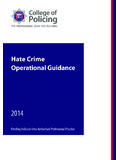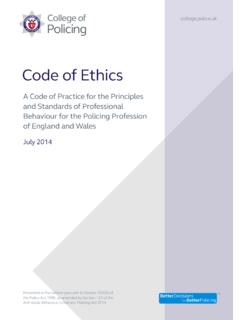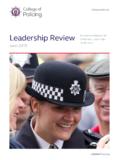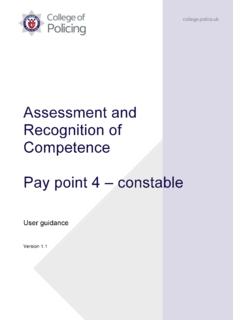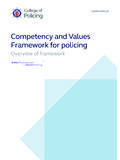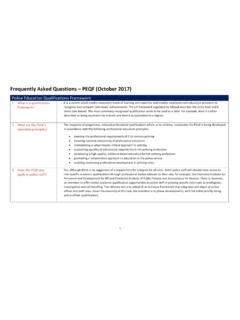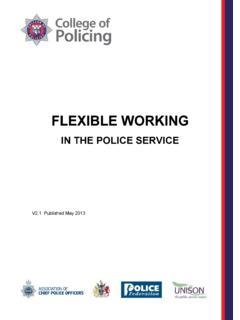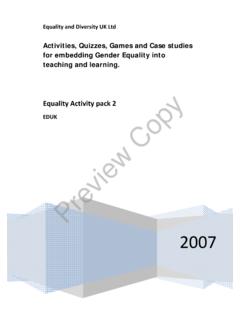Transcription of Template Front Cover Assessor Training Learner …
1 Assessor Training . Learner Workbook Version December 2014. OFFICIAL. Assessor Training Learner Workbook - College of Policing Limited (the College) December 2014. All rights reserved. No part of this publication may be reproduced, modified, amended, stored in any retrieval system or transmitted, in any form or by any means, without the prior written permission of the College or its representative. The above restrictions do not apply to Home Office police forces who are licensed by the College to copy and use this material for policing purposes within the police service of England and Wales. Some restrictions apply and forces may not copy or use any part of this material for audiences other than Home Office police personnel, distribute to third party providers (including Higher Education or Further Education) or use for commercial purposes without obtaining written agreement, in the form of a licence extension, from the College.
2 All enquiries about this product should be addressed to the Programme Management Unit on +44 (0)1423 876741 or The College is committed to providing fair access to learning and development for all its learners and staff. To support this commitment, this document can be provided in alternative formats by contacting the Programme Management Unit on +44 (0)1423 876741 or The College is committed to the promotion of equal opportunities. Every effort has been made throughout this text to avoid exclusionary language or stereotypical terms. Occasionally, to ensure clarity, it has been necessary to refer to an individual by gender. Page 2 of 52 OFFICIAL Version College of Policing Limited 2014. OFFICIAL. Assessor Training Learner Workbook Contents Purpose of the Document .. 5. Guide to the Learning Materials .. 6. Before you Begin .. 6. The Learning Materials.
3 6. Learning Outcomes .. 7. Section 1: Overview .. 8. Work-Based Holistic Assessment Model (WHAM) .. 8. Figure 1: Work-Based Holistic Assessment Model .. 9. Work-Based Assessment .. 10. Activity 1 .. 12. Assessment within the Police Service .. 13. Section 2: Structured Assessment .. 14. Assessment Protocols .. 14. Activity 2 .. 15. Roles and Responsibilities .. 16. What Assessors Need to Know and Do .. 16. Procedure and Recording .. 17. Quality Assurance .. 17. Section 3: Assessment Material .. 19. Valid .. 19. Authentic .. 19. Current .. 19. 20. Section 4: Assessment Decisions .. 21. Fair .. 21. Reliable .. 22. Transparent .. 22. Defensible .. 22. Standardisation .. 22. Section 5: Work-Based Holistic Assessment Model .. 24. Four Stages of Assessment .. 24. Stage One: Planning for 25. The Planning Meeting .. 26. Version OFFICIAL Page 3 of 52.
4 College of Policing Limited 2014. OFFICIAL. Assessor Training Learner Workbook Activity 3 .. 27. Stage Two: Conduct the Assessment and Collate Evidence .. 28. Forms of Assessment Material .. 28. Categories of Assessment Material .. 29. Observation .. 29. Witness Testimony .. 30. Examination of Work Products .. 31. Professional Discussion .. 31. Simulation .. 31. Accreditation of Prior Learning (APL) .. 32. Activity 4 .. 33. Stage 3: Evaluate Evidence and Make Assessment Decisions .. 34. Stage Four: Feedback Results .. 34. Section 6: Barriers to Accurate Assessment .. 37. Fatigue .. 37. Halo/Horns Effect .. 37. Personal Liking .. 38. 38. Similar-To-Me Effect .. 38. Stereotyping and Prototyping .. 39. Section 7: Quality Assurance and Internal Verification .. 40. Why Do We Need Quality Assurance and Internal Verification? . 40. Assessors .. 40.
5 Standardisation .. 41. Monitoring and Evaluation .. 41. Qualitative .. 42. Quantitative .. 42. Activity 5 .. 44. Glossary of Terms .. 45. Abbreviations Used in Assessment .. 50. References .. 51. Some Useful Further Reading .. 51. Personal Notes .. 52. Page 4 of 52 OFFICIAL Version College of Policing Limited 2014. OFFICIAL. Assessor Training Learner Workbook Purpose of the Document This workbook has been designed to meet the defined Police Sector Standard for the Training of Assessors, To help you meet the standard the College of Policing has developed the following resources: Self-study learners workbook; approximately six hours work subject to existing knowledge, skills and experience Classroom-Based Workshop; One-day workshop designed to consolidate these Assessor Training Learning Materials and provide opportunities to apply and practise assessment skills.
6 This Assessor Training Learner Workbook is designed to be used either as a pre-requisite to the classroom based workshop or as stand-alone learning. If you choose to complete the self-study workbook as a stand- alone please note in order to achieve the criteria set out in the Police Sector Standard for the Training of Assessors you will need to perform and evidence the practical elements of the criteria. It is therefore recommended that you find opportunities to practise the skills outlined in this self-study pack. If you are attending the one day workshop then you must complete this Assessor Training Learner Workbook prior to attending. These materials have been designed to: Introduce and explain the principles underpinning work-based assessment within the police service Provide a point of reference in relation to good practice for work- based assessment for a variety of applications including (Performance Development Review (PDR), accreditation and selection Provide a common understanding of equality and diversity; ethos of approach and terminology.)
7 Version OFFICIAL Page 5 of 52. College of Policing Limited 2014. OFFICIAL. Assessor Training Learner Workbook Guide to the Learning Materials Assessment in the police service occurs in many forms, some examples are: assessment of an individual's suitability for a role assessment of competence in a particular role or qualification assessment of ongoing performance for development performance management and assessment to professionalise the sector. To meet these assessment requirements a Police Sector Standard for the Training of Assessors has been developed to ensure consistency of the knowledge and Training provided to assessors across the service. Before you Begin A pre-requisite for the learning is a sound working knowledge of the following and their relation to your role and responsibility in the policing environment. Data Protection Act (1998).
8 Equality Act 2010. College of Policing Code of Ethics 2014. The Learning Materials The following learning materials will provide you with the underpinning knowledge you require when conducting assessments it is therefore important that you take the time to read them and complete the activities. The activities are designed to encourage you to reflect on your own assessment experiences and relate the theory of assessment practice to the specific field you will be involved in assessing. Before continuing please obtain a copy of the assessment strategy/guidelines you will be using in your specific field, as these are required to complete the activities within these materials. If you are unsure of what these are try to find a generic assessment system that you Page 6 of 52 OFFICIAL Version College of Policing Limited 2014. OFFICIAL. Assessor Training Learner Workbook are familiar with, for example your in force' Performance and Development Review (PDR) system.
9 Learning Outcomes When you have completed these learning materials you will be able to: 1. explain the concept of work-based assessment 2. identify the factors affecting the selection of the most appropriate assessment approach within a work-based context 3. explain the role and responsibilities of an Assessor 4. identify the assessment principles that underpin effective work-based assessment 5. identify the benefits of holistic incident/work-led assessment 6. explain the stages of the assessment process, identifying flexibility in approach to address a range of assessment needs 7. explain the principles and practices of standardising assessment to ensure quality standards are maintained. Version OFFICIAL Page 7 of 52. College of Policing Limited 2014. OFFICIAL. Assessor Training Learner Workbook Section 1: Overview Some of the terminology in the document may be unfamiliar to you therefore a glossary of terms and list of abbreviations has been provided at the back of the materials.
10 When we conduct work based assessment it is often considered an art rather than a perfect science but assessment does require a specific skill set. It can be that police officers and police staff can feel' they are naturally good assessors, however, research indicates that without adequate Training , many fail at their task (Anderson, 1992)1. It should be remembered that the success of an assessment in respect of obtaining the relevant information to prove that the assessment objectives have, or have not been met, depend largely on the skills of the Assessor not the person being assessed. Reading through these materials, implementing the guidelines and adopting the recommended techniques should improve your likelihood of conducting a fair and credible assessment. That is, making an informed decision as to whether the person being assessed has demonstrated or provided appropriate examples of their work, abilities or attitudes to meet the determined criteria for performance and knowledge.
